Tobey Maguire’s Hollywood hiatus: Why the ‘Spider-Man’ star preferred to fly under the radar
During August the ‘Spider-Man’ saga will return to the big screen to celebrate Columbia’s 100th anniversary and the franchise’s original star, one of the most atypical and mysterious actors of modern Hollywood, will return in ‘Spider-Man: No Way Home’
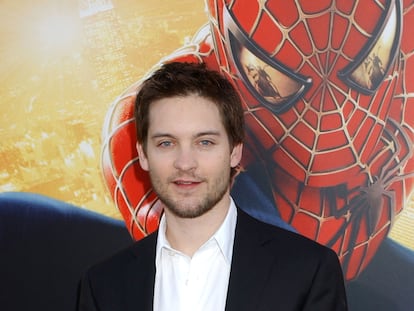
There have been few more exciting and publicized appearances than that of the three actors who played Spider-Man reuniting in Spider-Man: No Way Home, an exercise in nostalgia that had an additional value in the case of Tobey Maguire, who seemed lost to the world of acting. It did not mean the reconquest of Hollywood that many predicted, but it was confirmation that the immense talent he displayed under the orders of directors like Ang Lee or Woody Allen was still there, as was his eternal sleepy-boy face.
The fans’ favorite Peter Parker — for being the first, for the legendary kiss with Mary Jane and that emo dance that we could use as an example of the very definition of cringe — left cinemagoers wanting more. It doesn’t appear that Maguire’s return is on the horizon but a review of his trilogy is in Spain: in August, all eight Spider-Man movies will be re-released in cinemas. Nor is he expected to return to the big leagues, although his turn in Babylon gave hope to his fans. The Hollywood star who looks least like a Hollywood star seems very comfortable in his retirement, enjoying the parties with his friend Leonardo DiCaprio and the almost $75 million he pocketed from the Spider-Man movies.
Maguire had a complicated childhood; his parents were two 20-somethings who married and divorced in the space of two years and he spent her childhood between one and the other. “It was very painful. When I started sixth grade in Palm Springs, I threw up almost every morning for weeks.” Despite his extremely reserved nature, which has sometimes played against him, in an interview with The Guardian he spoke about his upbringing. “As a kid, I was very poor,” he confessed. “I mean, it’s all relative, but we would get groceries from neighbors. I always had a roof over my head, but I slept on couches of relatives, and some night we wandered into a shelter. My family had food stamps and government medical insurance. And I wanted to get out of that, so my ambition was initially to make money; I was pretty driven.”
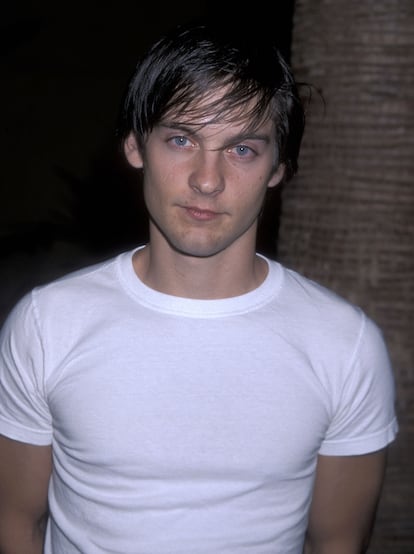
It was his mother who set him on his path; he wanted to be a cook like his father but she blackmailed him with $100 to choose drama instead. He accepted, of course. He joined the thousands of kids seeking a chance for themselves and their families in endless auditions in Los Angeles. He had a line in Blossom, and a couple in Roseanne, was a dead kid in Jake and the Fatman and unsuccessfully went through a dozen auditions to appear in The Wonder Years. He progressed slowly until he finally landed a starring role in the sitcom Great Scott! (1992), but it was canceled after nine episodes.
During that pilgrimage shuttling between auditions to secure a line in a sitcom, he forged one of the most important friendships of his life. He was filming on the street when he was approached by another 12-year-old boy shouting his name: it was DiCaprio, who had recognized him from the dozens of auditions at which they had coincided, “When I want someone to be my friend, I just make them my friend,” DiCaprio told Esquire, explaining how they had met. Both were in acting, lived with their mothers, and had had unconventional childhoods. They were eager to bond, to find an alternative family.
A friendship began that day that still endures now. They teamed up with another pair of child actors, Lukas Haas from Witness and Kevin Connolly, the sensible member of Entourage, and together they formed the gang that journalist Nancy Jo Sales baptized the “Pussy Posse.” The story didn’t paint them in a very good light, especially in terms of their apparent disdain for women, but it didn’t relate anything you couldn’t imagine: they were famous, wealthy, attractive 20-somethings with superlative egos.
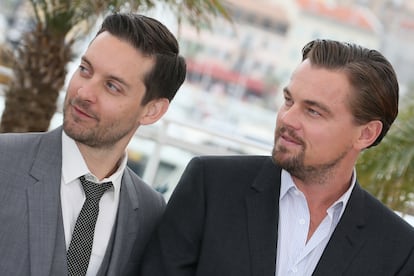
Together they recorded the controversial Don’s Plum, a ghost that haunted them for years. It had started out as a short film to which footage had later been added to take advantage of the performers’ newfound fame. More than the length of the footage, what bothered them was the fact that the dialogue — almost all of it improvised — left them looking like a bunch of toxic brats, over-exposed to the true personalities of two rising youth idols. The case was closed with a commitment that it would not be released in the U.S. or Canada.
Parties and endless nights in clubs were at that time the daily routine for Maguire, who at 19 decided to tone down the euphoria, joining Alcoholics Anonymous. Since then, he has not stopped praising the program. “It’s totally changed my life,” he told Playboy.
Along with DiCaprio he also had a small role in This Boy’s Life (1993) and after that came the film that made Hollywood take notice; The Ice Storm (1997), by Ang Lee, a story about the traumatic changes in American society in the 1970s in which he shared the screen with Kevin Kline, Sigourney Weaver, and Christina Ricci.
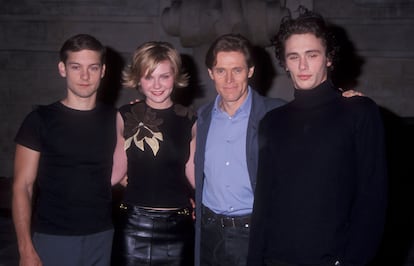
His melancholy gaze and introspective air were a perfect match for his character. His performance fascinated Lasse Hallström, who at the time was casting the adaptation of John Irving’s novel The Cider House Rules (1999), which garnered seven Oscar nominations. None went to Maguire’s subtle, almost abstracted performance. “He refuses to overdo it,” Hallström said at the time. He also received sympathy from Irving: “I don’t know if the best actors get nominated for roles as subtle as his.”
Another literary adaptation, Wonder Boys (2000), confirmed that he was no flash in the pan. In Curtis Hanson’s marvelous drama he played a bright, hypersensitive student who ends up in the bed of a worldly publisher played by Robert Downey Jr. (who was on probation at the time). He was chosen from a hundred hopefuls, but Hanson was clear that no other could have played the laconic James Leer. After three adaptations of best-sellers with substance that seemed designed to hoover up awards came Spider-Man, the film that changed superhero cinema and also the future of Hollywood.
What was one of the industry’s finest young talents doing masked and sheathed in spandex? “There is a lot of serious subtext to the character if you want to look for that,” he told Cinema. He landed a role that every 20-something in Hollywood, from Jude Law to Heath Ledger, from Chris O’Donnell to Chris Klein, aspired to. The choice did not please the fans too much, something that had already been experienced by George Clooney and Val Kilmer. Maguire was accused of being “too weak.” Avi Arad, former president and CEO of Marvel Studios, was clear in his mind from the moment he saw Maguire in The Cider House Rules: “That was Peter Parker, he was right there. He had the same lack of confidence. Everything about him said to me, this is the guy.”
The director, Sam Raimi, was of the same opinion: Maguire was his Spider-Man. The actor understood the apprehension of the fans: “I know people talk about my lack of charisma and I have to admit that I’m not a wild actor, it’s not in my nature to be too expressive and that’s why it’s a great challenge as an actor to be able to play him and change people’s perception of me,” he confessed. He trained for six months to achieve Parker’s volume and toned look. The result was a surprise to everyone. The film’s success at the box office exceeded all expectations. A star and a franchise were born.
The inevitable sequel did not go as smoothly. According to Variety, Maguire tried to change the filming schedule, citing severe back pain, and even brought his neurosurgeon to talk to Columbia executives. The situation became so tense that the production company, assuming that all the actor wanted was more money, approached Jake Gyllenhaal to replace him. It was a logical move as at the time he was dating Kirsten Dunst, whom Maguire had dated during the filming of the first installment.
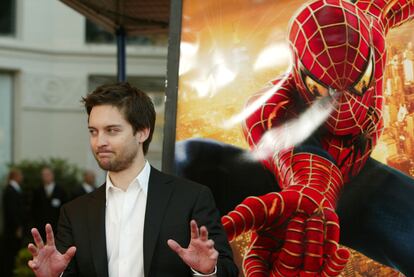
Maguire’s back magically healed and the incident went down in the history of the saga, literally: in the new installment, Spider-Man: No Way Home, there is a joke about Maguire’s lower back. He recovered so well from an injury he said he feared would leave him paralyzed for life that he shot a third movie that no one liked: too many villains, too many Spider-Men and too little script. What at the time was considered the most expensive film ever made did well at the box office, but it convinced everyone that Maguire would never be Parker again. And he was almost never anyone else.
Two years later he starred in Brothers (2009) alongside Jake Gyllenhaal and Natalie Portman, and in 2013 he accepted the call from DiCaprio to play Nick Carraway, the guy through whom we meet Gatsby in Baz Luhrman’s The Great Gatsby, a role with certain similarities to his own life. A year earlier he had suffered a strange disappointment: seeing his role in Life of Pi completely re-recorded by Rafe Spall. In the words of Ang Lee, his discoverer, Maguire was “too recognizable” and affected the credibility of the film.
Since then, there has been a big gap in Maguire’s career, beyond the reunion of the three Peter Parkers and his participation in Damian Chazelle’s Babylon, of which he is also a producer and where he plays a very dark and sinister character, far removed from those he used to play and that he himself chose because “I wanted to immerse myself in something I had never done before.”
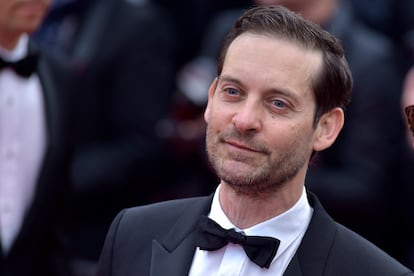
He has other interests: he is fascinated by puzzles and especially poker. His games are legendary and not always without controversy. In 2011 he had to litigate to avoid having to pay back $311,000 he had won a few years earlier because the money had been stolen from investors through a pyramid scheme. Maguire did nothing illegal, but it was not the best publicity for a Hollywood star. If his fondness for gambling was an open secret, it was a film in which he did not participate that laid it bare: Molly’s Game, by Aaron Sorkin, the true story of a clandestine poker game organizer in which prohibitive figures were handled and in which the actor is apparently reflected in a less-than-flattering light.
“Winning $20,000 was like losing,” said Huston Curtis, the author of the novel on which the film is based. He and Maguire were in charge of organizing the most popular games in Hollywood “for fools who couldn’t even shuffle.” From 2005 to 2009, every Tuesday night, celebrities like Ben Affleck, Matt Damon and DiCaprio “always won” at the tragically famous Viper Room (where River Phoenix died) or at the Four Seasons in Beverly Hills. It didn’t go badly for Maguire either, who, according to Curtis, made $40 million during those years.
Also involved in the business was his then-wife, jewelry designer Jennifer Meyer, daughter of top NBC executive and vice president Ron Meyer, to whom he was married until 2016 and with whom he has two children. Their divorce marked a turning point; DiCaprio returned to revive the Pussy Posse, of which he was the sole survivor. In 2016, the posse reunited to celebrate DiCaprio’s Oscar for The Revenant in style and since then, the actor who has never succumbed to marriage and Maguire have been spotted in every club in Los Angeles, on the French coast, and in Ibiza, leading the life the posse dreamed of when they couldn’t even imagine the success they would one day achieve.
Sign up for our weekly newsletter to get more English-language news coverage from EL PAÍS USA Edition
Tu suscripción se está usando en otro dispositivo
¿Quieres añadir otro usuario a tu suscripción?
Si continúas leyendo en este dispositivo, no se podrá leer en el otro.
FlechaTu suscripción se está usando en otro dispositivo y solo puedes acceder a EL PAÍS desde un dispositivo a la vez.
Si quieres compartir tu cuenta, cambia tu suscripción a la modalidad Premium, así podrás añadir otro usuario. Cada uno accederá con su propia cuenta de email, lo que os permitirá personalizar vuestra experiencia en EL PAÍS.
¿Tienes una suscripción de empresa? Accede aquí para contratar más cuentas.
En el caso de no saber quién está usando tu cuenta, te recomendamos cambiar tu contraseña aquí.
Si decides continuar compartiendo tu cuenta, este mensaje se mostrará en tu dispositivo y en el de la otra persona que está usando tu cuenta de forma indefinida, afectando a tu experiencia de lectura. Puedes consultar aquí los términos y condiciones de la suscripción digital.









































